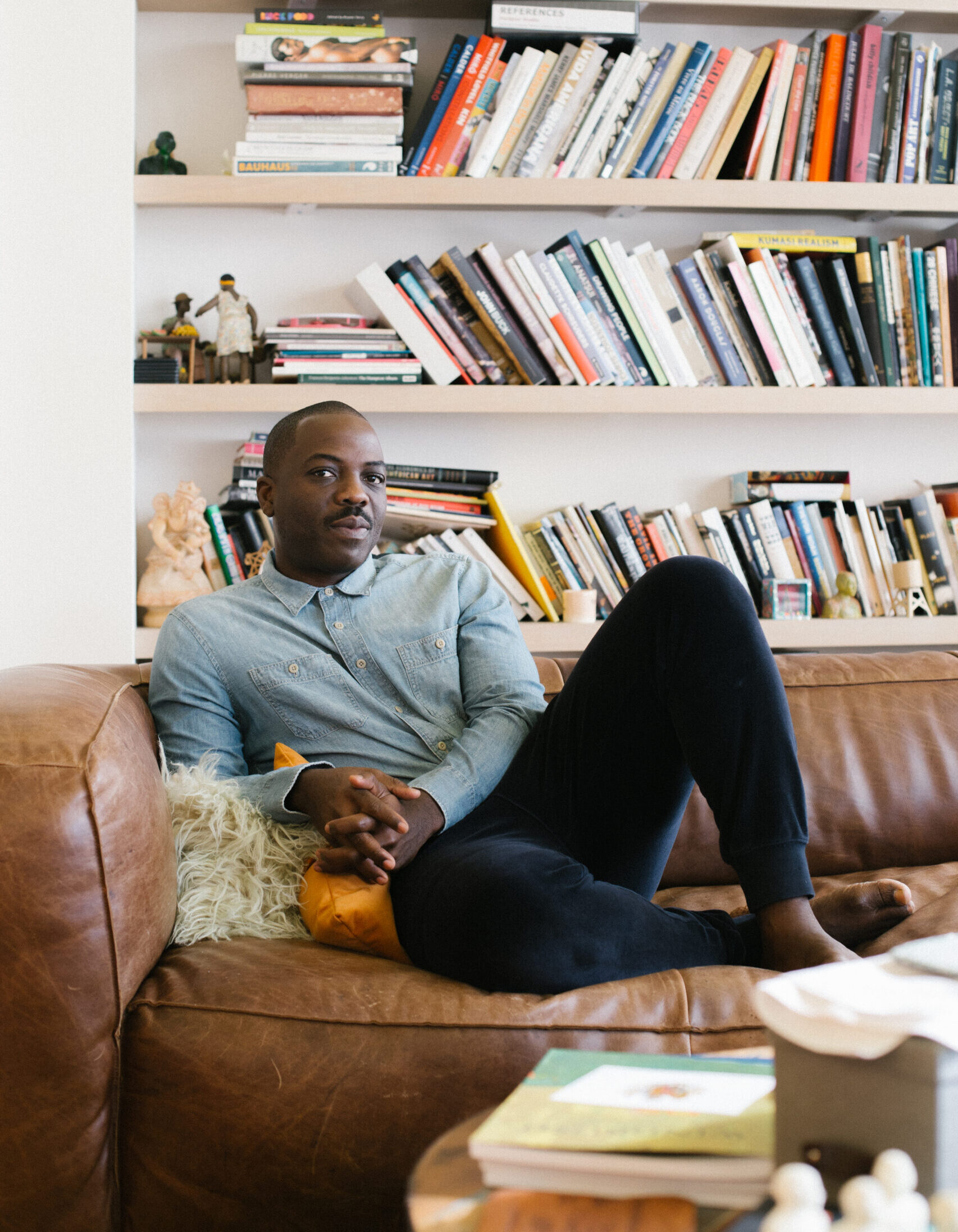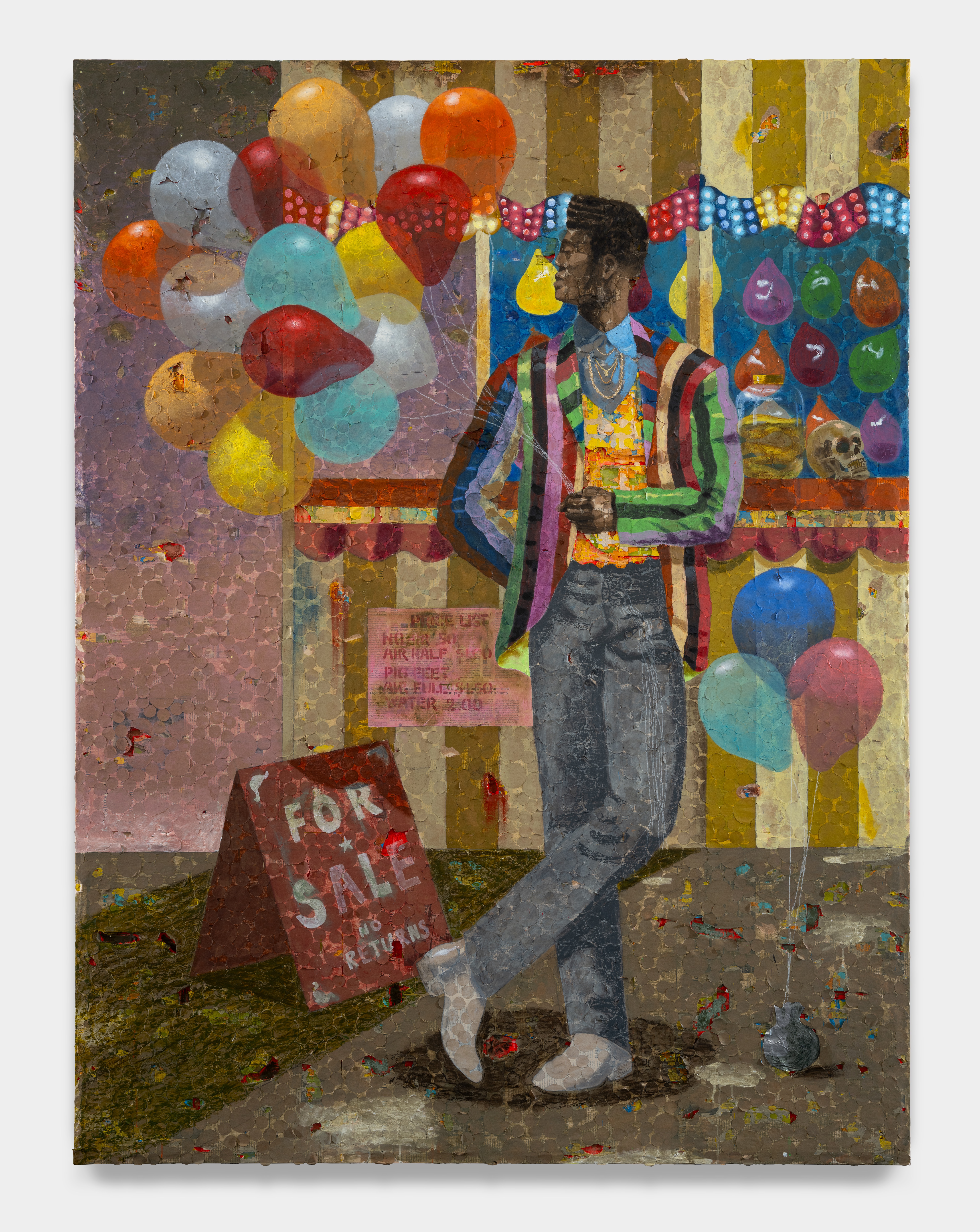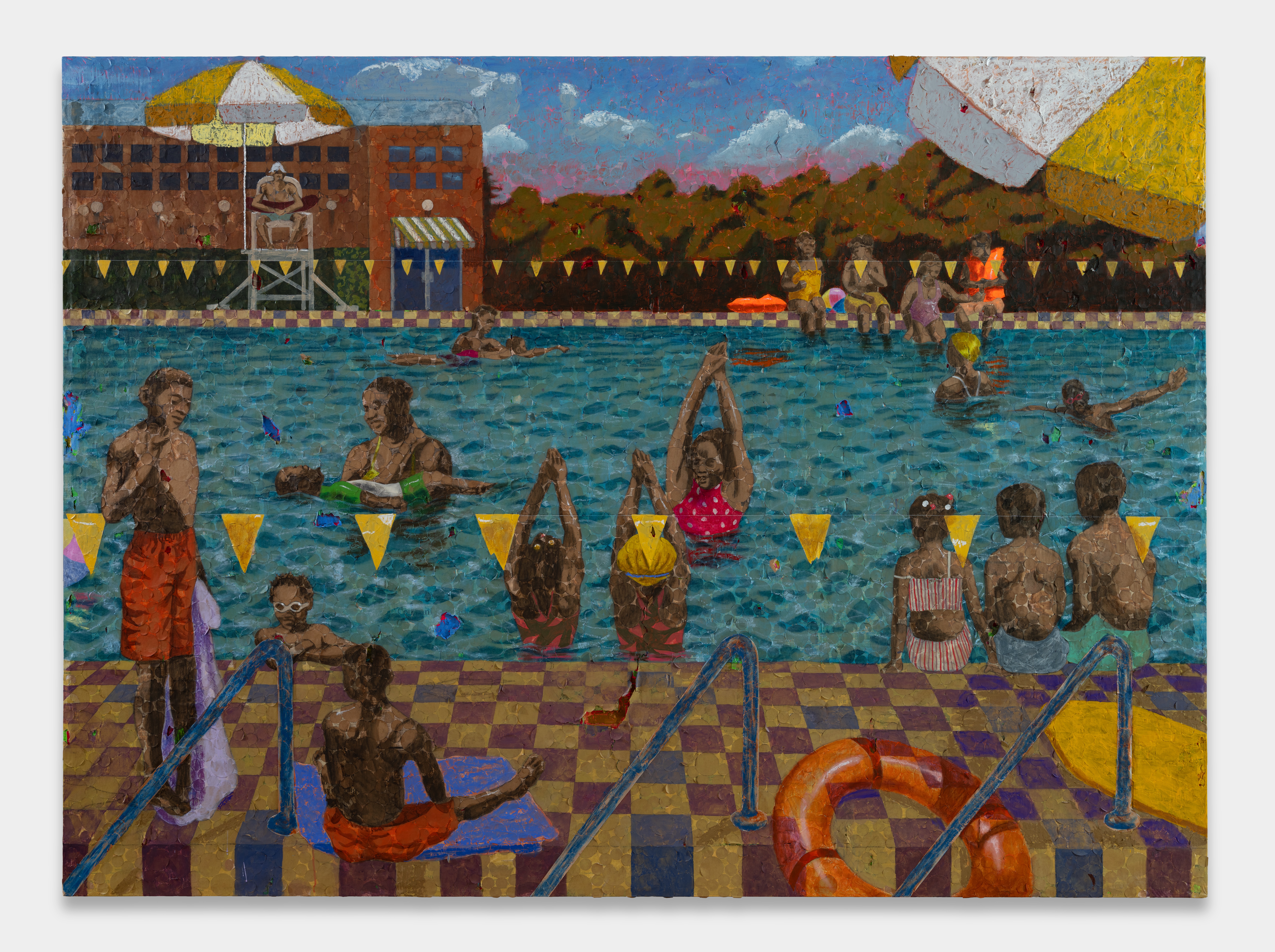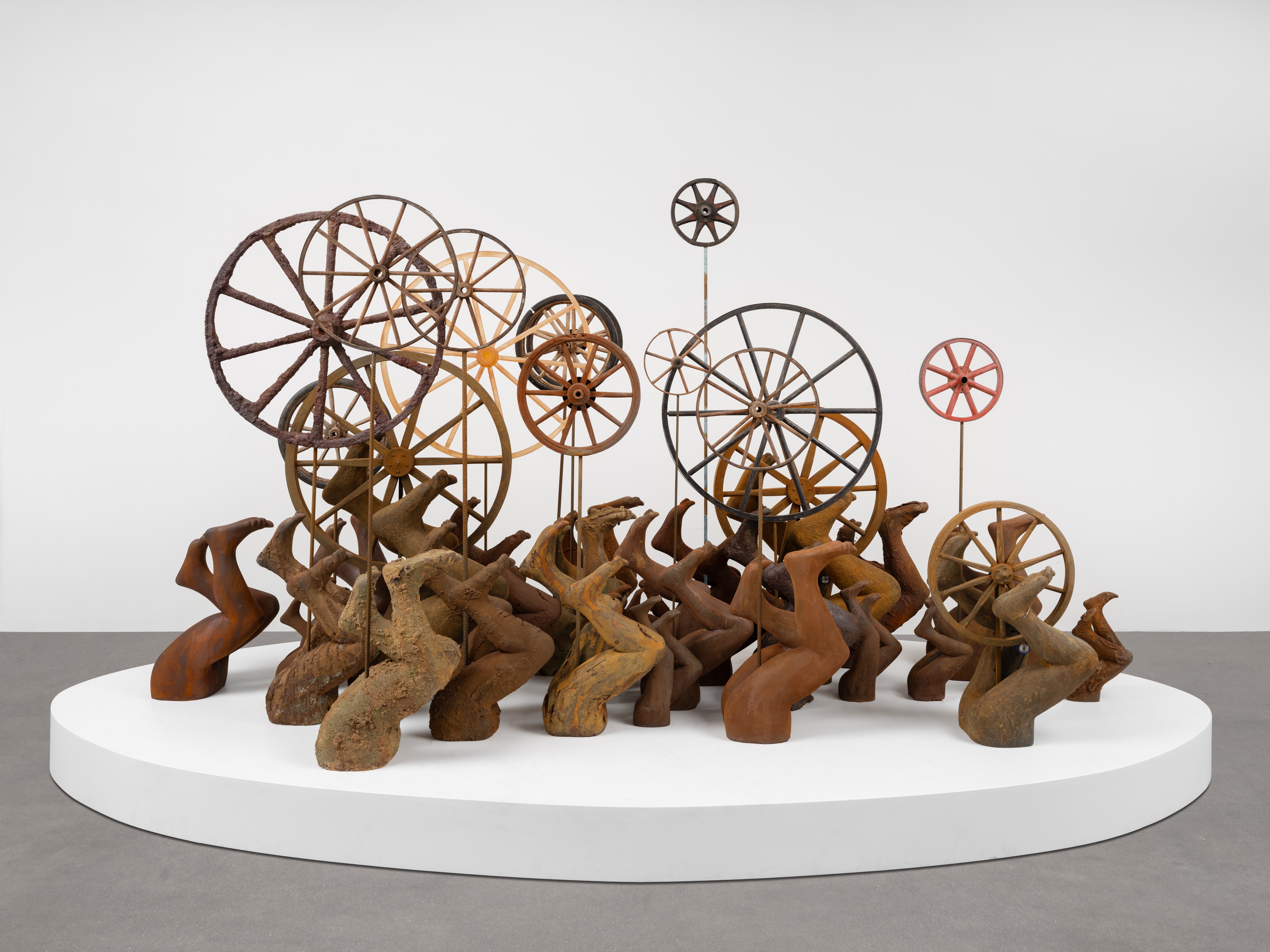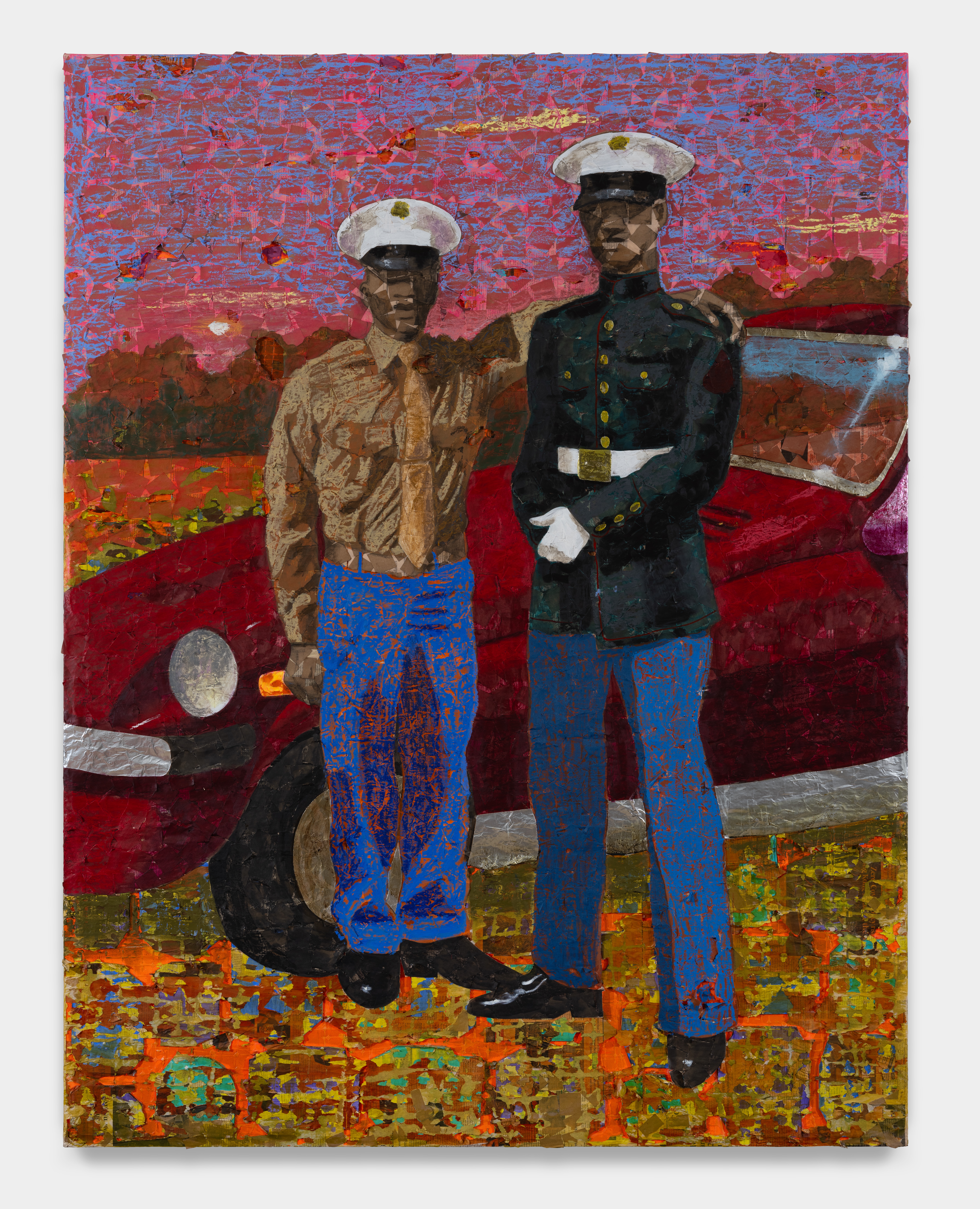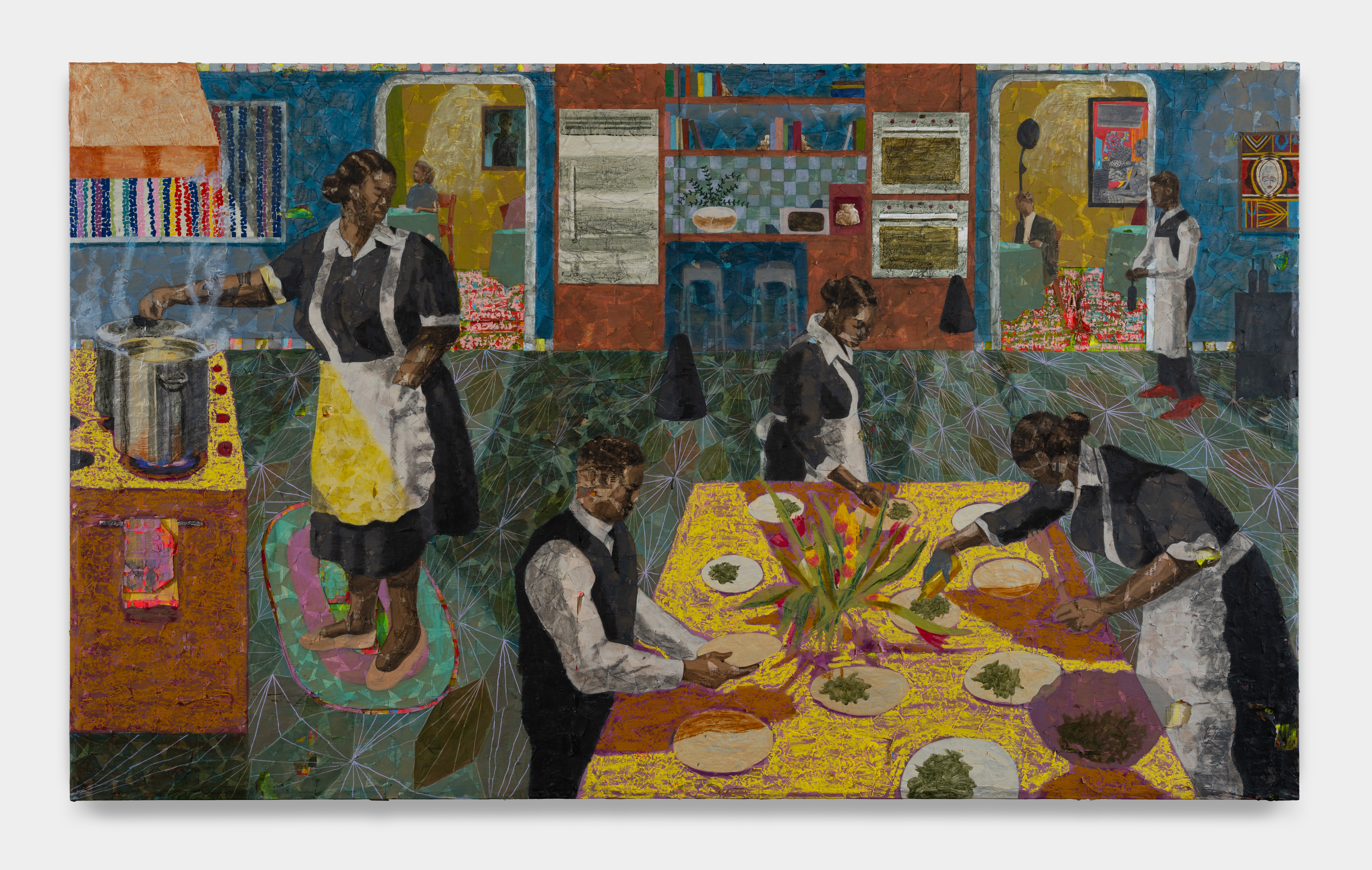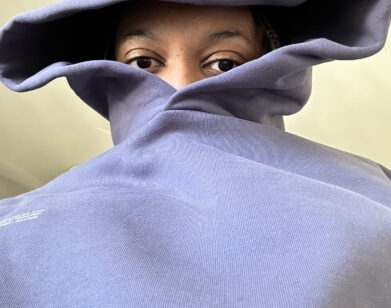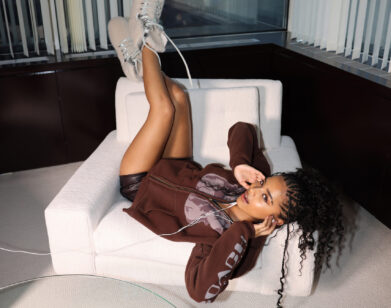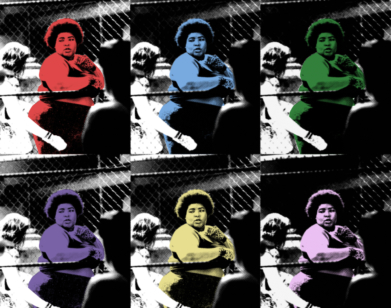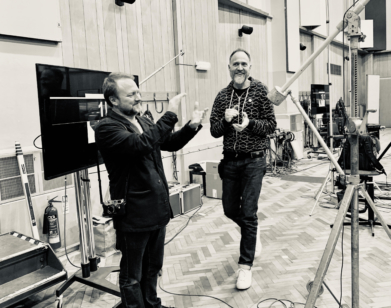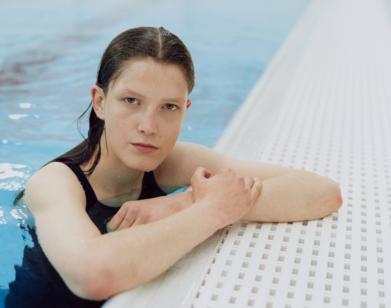STUDIO VISIT
For Artist Derek Fordjour, What Happens in the Studio Stays in the Studio
To Derek Fordjour, the stakes are high in art. “There are a lot of paintings in the world,” he remembers a graduate school professor telling him. “Why do we need another one?” Ever since, the Ghanaian-American artist has made sure his work toys with the big questions, and his newest show, which opened last week at Chelsea’s Petzel Gallery, is no exception. Titled SCORE, it’s an exploration of the parallel meanings of “score” in Fordjour’s work—to excavate, to compose, to compete—through sculpture, paintings, and performance art in collaboration with dancer Sidra Bell and banjoist Hannah Mayree. It’s his most personal, autobiographical show yet, and as he tells his friend, the comedian Trevor Noah, who called Fordjour from Minneapolis, “It’s in that space between real life and the unreal that we create.”
———
TREVOR NOAH: D, what’s going on, my man?
DEREK FORDJOUR: Brother Trev. Thank you so much.
NOAH: Oh man, come on. You know it’s my pleasure.
FORDJOUR: I know how much you move around the world. Speaking of which, where are you in the world now?
NOAH: I’m currently in Minneapolis. The home of Prince, another artist. I feel like it’s fitting that I’m speaking to you from this place.
FORDJOUR: I mean, what a long shadow. I think about George Floyd now when I think about Minneapolis, and that was never the case, so I’m happy to be reminded about Prince.
NOAH: Oh, damn. It’s the paradox of the Black experience in America. It’s the pinnacle of success and the ability to completely shape the world, and on the other hand, it is the subjugation and oppression of a people… It’s pretty wild when you think about it.
FORDJOUR: It’s wild and it’s ever-present. So we can never get lost in the revelry of Prince and his genius. There’ll be a disruption at some point.
NOAH: I only realize it now that I said it out loud, but that’s almost exactly what your work does. It’s both a celebration of the Black experience and its excellence and power, and at the same time, it’s an examination of everything that Black people have had to experience. How’s your show coming along? Are you sleeping?
FORDJOUR: Look man, the show is buzzing now and it’s not done. So it’s going to come down to the wire. You and I are both pretty cool-headed fellows, but all these last-minute shenanigans are really just nerves. I’m 20 pounds heavier than I need to be. It’s all this chaos that I create for myself. Big shows always come down to the wire for me. I’m talking to my therapist about this now, why I just can’t seem to land the plane without drama.
NOAH: I almost feel like I can give you an answer for that but—
FORDJOUR: No, I want your answer. It’s a lot more affordable.
NOAH: So here’s what I think. Because art isn’t a fixed location, there is no way to determine whether or not it is complete. If you’ve built a building, I can go through a checklist and I can tell you that it’s complete. If it does not have windows, the building’s not complete. But with art, the missing window might literally be the reason it is art. So I actually wonder how you maintain any type of sanity. I’m shocked that you even think you’re landing the plane. I feel like you’re flying and you’re just dropping passengers off at an airport and then taking off. You don’t even land. They just have to jump out.
FORDJOUR: First of all, that is the case I make for every late deadline I arrive at. I really feel very little shame about missing deadlines, which is a problem for everybody that works around me. But you’re right, it’s so wonky and unpredictable. Do you know when a set is done?
NOAH: No, I don’t. This is why every artist needs constraints. It’s never finished. There are times when I’ve done a standup special—in fact, this happens every time. I’ll record the special and then in the weeks leading up to its release, I find new ideas for the jokes that I put out. I’m like, “Damn, I could have done it like that.” Do you ever think of something else you could have done with your paintings after you’ve put them up on walls and they’re no longer accessible to you?
FORDJOUR: All the time. I don’t even like to spend a lot of time around completed works. Maybe this is true for you too, but I feel like I have to have two modes of consuming an artwork. One is the critical, which happens in my studio. I just want to improve it. I want to shape it. But that’s a creative hat. When it leaves, I have to put on a different hat. I have to become a spectator with everyone else. Because if I keep the critical hat on, I may kill it for everybody. I’ve had to mature enough to understand that the conversations in the studio don’t belong in the street.
NOAH: Yeah. You’re the chef sitting at the dinner table lamenting the fact that you sneezed into the soup, and we’re eating the soup going, “We were enjoying this until you told us that.”
FORDJOUR: You just worked on your feet. The sneeze, that’s what made that a joke. So to me, your comedic brain is always working. You didn’t say, “I’m going to make a joke.” Do you think in terms of comedic potential, or is that a reduction of how your brain works?
NOAH: No, I think my brain works in an incongruous way. I think every artist’s brain does. It is not working in tandem with the world, and that’s what I think art comes from. The world is colliding against your brain in a way that makes it vibrate differently from other people’s.
FORDJOUR: I just saw you in New York at the Beacon Theater, and because I know you, one of the things that’s great about watching you is that the audience is actually getting a real piece of who you are. You don’t really become someone else on stage. You’re a private person, but you’re really honest up there. I believe that my artwork has to be authentic, too.
NOAH: The thing is, I don’t think that somebody who becomes another character for their art is any less authentic. But for me, it’s a little less sustainable. You want to exist in the space that you’re in for as long as possible. Your new show at the Petzel Gallery—SCORE, right?
FORDJOUR: Yeah.
NOAH: Let’s start with that. Why SCORE? The word “score” could literally mean seven different things to seven different people.
FORDJOUR: Exactly, and that’s what attracts me to it. So I have a big birthday next year. I’m on the precipice of 50, and I’m looking back on the score of my life and I do think about score in all these ways. I am building a choreographic score with a choreographer, quite literally. I had a friend who said, “You got married last year. You scored the girl too,” which is not something I had really thought about, but it really is the score of my life. So I’m making the most personal works I’ve made, but thinking about how those moments are accessible for other people. That’s what SCORE is about.
NOAH: I love that. I feel like you’ve unintentionally taken it back to its original setting, because if I’m not mistaken, the word “score” actually comes from old Norse. It was how they would count things by marking sticks, like notches, before numerals. But I love the imagery because in many ways you’re notching. You’re actively chipping into the artwork, you’re cutting away. And you’re marking time, you’re marking your progress in the image as it moves. I don’t know why I found that so perfect.
FORDJOUR: I love that you taught me that. This is so damn Trevor Noah, to go to the Nordic origins of the word. This is one of the most attractive features of my relationship with you, that we’re both genuinely curious people. But I have to ask you, why this tireless intellect? Where does that come from? I even looked you up like, is this guy a scholar?
NOAH: That’s so funny. I think I grew up in a home of intellectual curiosity. Till this day, my mom will ask me random questions. She never stops. She’ll see a bridge and she’ll ask me, “How did they do that?” And I think it’s obvious. And then she’ll go, “Explain it.” And when I’m forced to explain it, I realize that it’s not obvious and I’ve taken something for granted. So I’m always trying to believe that I don’t know anything, because I don’t.
FORDJOUR: I love that you cite your mother because you really can’t inherit an intellect. I’m sure she was aware that she was shaping you through that constant engagement.
NOAH: I don’t even think so. I think it’s innately her.
FORDJOUR: Okay, that’s fair.
NOAH: But you do the same thing. I’ve yet to see a single artwork of yours that is not attached to a deeper story of a time that has passed, or that currently exists, or a time that never was. For instance, the jockeys in one of your previous artworks. It goes into the history of Black horse riders in America and the idea of the commodity in horse racing. It’s something I’ve always loved about your art, that it always feels like it’s moving through time. I remember I went to Florence and—
FORDJOUR: Wonderful place for paintings, by the way.
NOAH: We were on an art tour, and one of the things they showed us was a style of art. I’m sure you’re familiar with it. I don’t remember the name. It was almost 3D and felt like it was moving, and it told a story. The historian told us that those used to be the movies of the time. That art would move around from city to city, and people sometimes even pay to see how the battle unfolded or how a great wedding took place. And I thought the same thing about your art.
FORDJOUR: Wow.
NOAH: I’ve always wanted to know, why do you think almost every single one of your pictures is moving from something and towards something?
FORDJOUR: That’s really kind and such a big and wonderful question. I mean, something has to be at stake. My investment has to be something greater than where this painting is going to hang or what someone is going to pay for it. Those things don’t get you through what it takes to make an artwork. I remember in a graduate school critique, a professor once said, “There are a lot of paintings in the world. Why do we need another one?” And that’s the question you need to be answering when you make a work. Am I moving the conversation forward? We’ve heard a lot of jokes. Do we need another act? In my live show, ARENA, which I did with Sidra Bell, we have an anthem, and you have a joke about anthems.
NOAH: Yes.
FORDJOUR: But you’re really asking a deeper question about how countries deliver their anthems, and you’re poking fun at nationalism. It’s a really smart joke because it really is asking a deeper question about patriotism and propaganda. Am I reading too much into that?
NOAH: No.
FORDJOUR: I want to know what your attraction to that joke was and why.
NOAH: So I found myself intrigued by the reinforced labels we give ourselves. People will say, without a blink of an eye, “I am an American, I am a South African.” But are you? If you move, are you still? If you don’t live like that, have you ever been? There’s a deeper understanding of how national identities are formed, and an anthem is the perfect encapsulation of that. It’s a nation trying to reinforce an idea that it has of itself.
FORDJOUR: There’s an absurdity to it.
NOAH: Yes. And at the same time, a completely functional normalcy to it. What I think is absurd is how we don’t reexamine our norms as time goes by. We just keep them the way they are.
FORDJOUR: Listening to your answer makes me understand why we both do what we do. I can’t speak for you, but it’s said that design solves a problem and art asks a question. So art is about the question, it’s not about the answer. It’s about the opportunity to poke at a thing safely, like nationalism. Does comedy function that way?
NOAH: I think you’ve hit the nail on the head, and I think your art does the same thing. Art provides a safety blanket around a topic so that while it may be uncomfortable or conflict-adjacent, you can process it with a different side of your brain. Through your work, people are able to process a lot more information than they would about the real world if they were just in it. Sometimes art just provides you a margin. It provides you a little gap so that you can process and consume something that is very real, knowing that the thing you are consuming is not real.
FORDJOUR: And that gap is the opportunity for us, for artists, right? It’s in that space between real life and the unreal that we create. Being in a theater under dark lights allows enough anonymity and distance to take the position of the entertained. I’ll tell you, when I was younger, I used to be really funny before life got real. People used to say, “Man, you would make a good comic.” And I used to say, “I’m too smart to be a comic.” Now I realize I wasn’t smart enough to be a comic. I actually learn every time I speak to you.
NOAH: That’s funny. We’re experiencing many of the same highs and lows. Every artist has the same vulnerabilities. Do people expect me to do more of the same? Do people expect me to create new? Is it too new? As a visual artist, how do you get over that anxiety about people now telling you that you are not creating a “Derek Fordjour work”?
FORDJOUR: That happens. I’m sure you have lots of people around you who say, “That’s not you, Trevor.”
NOAH: Yeah.
FORDJOUR: And that’s a certain level of success because you’ve put enough work out there that people feel like self-appointed experts on your work. It’s a compliment. Look, I was unsuccessful for a long time and nobody cared about any paintings I made, so I’m excited whenever people engage in the things that I make, no matter how they choose to interact with it. And I take the position of learning. You’re going to see my works differently than I did. That’s the gift to me, sincere engagement. It’s like, you don’t need everybody to love a joke. I mean, there’s probably a consensus around where you want to land, but I don’t think you require everyone that comes to your show to love everything you say. So for me, the theater of the public is where I can be humbled, listen, and learn, because the way I look at a painting now is different from the way I look at it in five years. I remember you once telling me how your work on The Daily Show ages. It’s important. And I will say, I hope you’re going to make a special out of what I saw at the Beacon, because this is a different Trevor. It allows people to get a lot closer to you than they got on television. I can’t wait for you to share it.
NOAH: I appreciate that. We’ll put out a version of it at the end of the year, actually.
FORDJOUR: What’s it called?
NOAH: I’m thinking of a title right now. Maybe we’ll chat about that.
FORDJOUR: Well, check with the Nordics. It’s quite generative so far.
NOAH: Oh, amazing.

